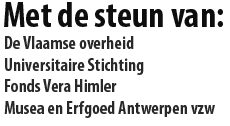A. VRINTS
De codes van de kroeg. Het openbaar lokaal tussen orde en wanorde in Antwerpen (1910-1950)
Summary: Codes of the pub. The public room between order and chaos in Antwerp (1910-1950)
Since the elite stopped visiting the pub in the early modern era, they started considering pubs and drinking to be a source of ‘chaos’ in all kinds of ways? The moralistic look of the elites towards pub visits does no right to its functionality for the lower classes according to 20th century police sources in Antwerp. They went to the pub to maintain informal social bonds and renew reciprocate relationships. Pub visits may have regularly resulted in drunkenness but the central goal was sociability.
That pubs were a more tolerant place doesn’t mean that he elite view of a ‘lack of morality’ was true. The festive atmosphere in the pub, which was regarded as a condition to cultivate sociability, may not be compared to anarchism. On the contrary, life in the pub was permeated with norms, conventions and opinions that structured the interaction among pub goers and between pub goers and innkeepers.
No more than pub life in general, may we interpret the violence in especially pubs as a consequence of the chaos created by excessive alcohol use. The brawls in and around pubs fitted into the strongly formalized conflict regulation in informal social networks.
The pub was chosen for this anything but “senseless” violence just because its function as a focal point of the informal sociability allowed for conflicts to be resolved under the eyes and control of the public.
,
A.K.L. THIJS,
Wy hopen te vercryghen tgroot lot”. De dynamiek van de loterijen in het maatschappelijk leven van de Zuidelijke Nederlanden tijdens de preïndustriële periode
Summary: The dynamics of the lotteries in social life of the Southern Netherlands during the preindustrial period
The lotteries in the early modern age functioned as an exceptionally democratic means of mass communication. By the way they were organized, for centuries the lotteries gave very normal people the chance to voice their unvarnished opinion on God, man and society for many to hear. However, this free word was negated by the government when it introduced the number lottery during the 18e century. In the 19th century the bourgeoisie and middle classes made their profit by using the so called tombola (small-scale lotteries for a ” good cause” in which their were no money prizes) for defending the existing social order.
From a popular and historical point of view, the documents left to us from the lotteries are of great value. They inform us not only about the perception of the social relations, but also about the aspects of the material culture. They shed light on an interesting process of cultural exchange, where elite material objects began to function within a cultural circuit for which they were neither conceived nor made. Thanks to the many short texts (“lottery prose”), made by the players themselves, we experience firsthand what interested these people daily during the early modern era, both mentally and emotionally: what they desired from life, what leans they hoped for to fulfill their wishes, what they thought about the unequal distribution of power and means in their society.
,
S. TOP,
Cultuurpolitiek en Volksverhalenstudie in Vlaanderen (1830-2000)
Summary: Culture politics and popular story in Flanders (1830-2000)
The Belgian independence in 1830 created a serious language issue because only French was recognized as official language. This linguistic discrimination led to the intensifying of the Flemish awakening, with important names such as J.F. Willems, H. Conscience, P. Van Duyse. During this development, Conscience’s De Leeuw van Vlaenderen (1838) (The lion of Flanders) became a powerful culture historic weapon to turn the tide. Another positive impulse came from two young German intellectuals who improved the song and popular story study in the LOW COUNTRIES but especially in Flanders. The presence of A.H. Hoffmann
von Fallersleben en J.W. Wolf was very inspiring and led to the founding of all kinds of local and regional popular magazines.
The edition of Volkskunde in February 1888 signifies a broadening in many ways: geographically, methodically and definitely in a culture political way as well. P. DE Mont, A. Gittée and A. De Cock have launched this magazine brilliantly and made it thrive.
In their wake, many have continued until this day. Nowadays, it is striking that several governments (UNESCO, Europe and Flemish government) mainly focus on immaterial heritage with popular tales taking up the pole position.
,

